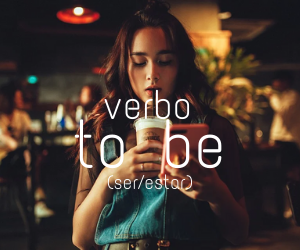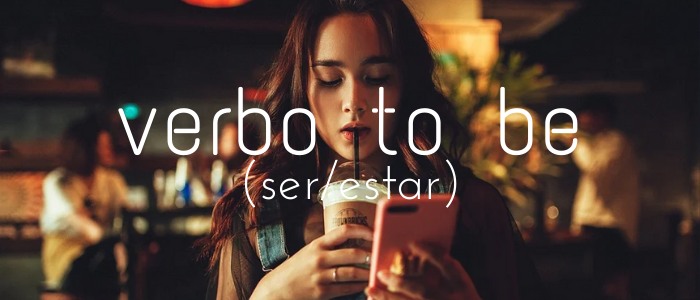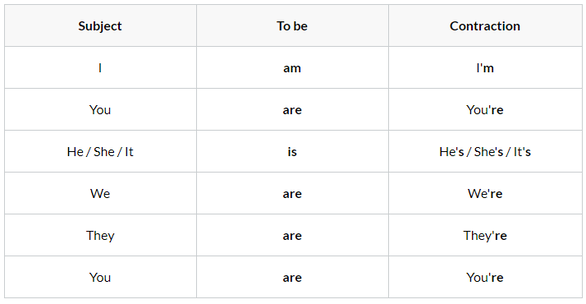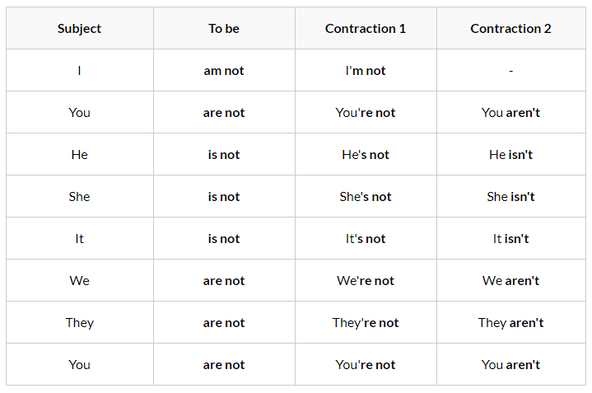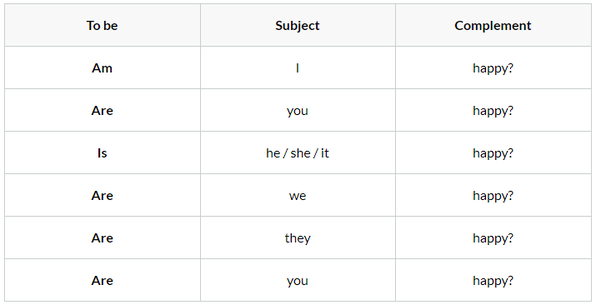| To be como verbo ser
| To be como verbo estar
|
Subject pronouns |
Verb to be |
Translation |
I |
(+) am (-) am not |
(+) Yo soy/estoy (-) Yo no soy/estoy |
He She It |
(+) is (-) is not/isn't |
(+) Él es/está (-) Él no es/está (+) Ella es/está (-) Ella no es/está (+) Eso es/está (-) Eso no es/está |
We They You |
(+) are (-) are not/aren't |
(+) Nosotros somos/estamos (-) Nosotros no somos/estamos (+) Ellos son/están (-) Ellos no son/están (+) Tú eres/estás (-) Tú no eres/estás |
| Affirmative form (+) I am -> I'm (+) He is -> He's (+) She is -> She's (+) It is -> It's (+) We are -> We're (+) They are -> They're (+) You are -> You're | Negative form (-) I am not-> I'm not (-) He is not -> He isn't (-) She is not -> She isn't (-) It is not -> It isn't (-) We are not -> We aren't (-) They are not -> They aren't (-) You are not -> You aren't |
- Hello, I'm John - Hola, soy Juan.
- He's George - Él es Jorge.
- She is my girlfriend - Ella es mi novia.
- They're my parents - Ellos son mis padres.
- She is tall - Ella es alta.
- His eyes are green - Sus ojos son verdes.
- John is not married - Juan no está casado.
- You're beautiful - Tú eres hermosa.
- My grandparents aren't very old - Mis abuelos no son muy viejos.
- The children are friendly - Los niños son amigables.
- The house is new - La casa es nueva.
- Today is Monday - Hoy es lunes.
- It's 15 dollars - Son 25 dólares.
- The chairs are made of wood - Las sillas están hechas de madera.
- They're big - Son grandes.
- I'm from Spain - Soy de España.
- We are from London - Somos de Londres.
- She's in the bathroom - Ella está en el baño.
- It's on the table - Está sobre la mesa.
- The bank is on your left - El banco está a su izquierda.
- I'm fine - Estoy bien.
- Anna is angry with me - Ana está enojada conmigo.
- They're hungry - Ellos tienen hambre.
- It's four o'clock - Son 4 en punto.
- It's cloudy - Está nublado.
Algunas traducciones del verbo to be al idioma español pueden variar cuando lo usamos para expresar la edad, un sentimiento, clima, etc. Por ejemplo:
- Maria is 25 years old - Maria tiene 25 años.
- Peter is thirsty - Pedro tiene sed.
- It's hot - Hace calor.
- I am here now - Estoy aquí ahora.
- You are an engineer - Tu eres un ingeniero.
- He is late - Él llega tarde.
- She is sick - Ella está enferma.
- It is a old book - Es un libro viejo.
- We are busy - Estamos ocupados.
- You are married - Ustedes están casados.
- They are from Colombia - Ellos son de Colombia.
- I’m not angry - No estoy enojado.
- Kevin’s not my neighbor - Kevin no es mi vecino.
- That’s not right - Eso no está bien.
- Susan and Leo aren’t married - Susan y Leo no están casados.
- My wife and I are not interested in Facebook - Mi esposa y yo no estamos interesados en Facebook.
- Am I early? -Yes, you are - ¿Llegué temprano? -Si, si llego.
- Are you sad? -Yes, I am - ¿Estás triste? -Si, si lo estoy.
- Is he French? -Yes, he is - ¿Es él francés? - Si, si lo es.
- Is she from France? -Yes, she is - ¿Es ella de Francia? - No, no lo es.
- Is it a small box? - Yes, it is - ¿Es una caja pequeña? - Si, si lo es.
- Are we ready? - Yes, we are - ¿Estamos listos? - Si, si lo estamos.
- Are you teachers? No, we aren't - ¿Son profesores? -No, no somos.
- Are they worried? - Yes, they are -¿Están preocupados? -Si, si lo están.
